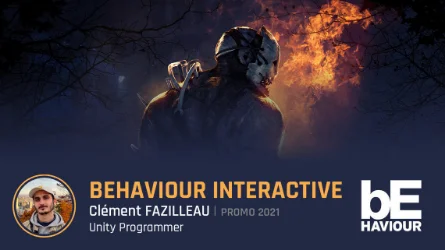Game Programming
Develop scientific and technical expertise applied to video games
Admission
High School Diploma +
Entrance Exam
Duration
5
Years
Degree
Level 7 RNCP – Master’s Degree
Rhythm
Full Time
then Cooperative education
in Master’s
Campuses
PARIS
MONTREAL
Home » Degree Programs » Game Programming
100%
Graduates
(2021/2022/2023 years)
94%
Employment rate of last three graduate classes
95%
Alumni satisfied with their course (2021/2022/2023 years)
Training
Game Programming Degree
Program taught in French
The Game Programming program trains high-caliber, well-rounded profiles who possess both technical and scientific skills related to video games and solid cross-disciplinary skills.
Students are trained in the production pipelines, technologies and challenges of the digital sector, particularly video games. They are ready to take on tomorrow’s challenges, whether related to
Artificial Intelligence or physically realistic graphics rendering.
The Game Programming course trains high-level, all-round profiles with both technical and scientific skills related to video games and solid cross-disciplinary skills.
Students are trained in the production pipelines, technologies and challenges of the digital sector, particularly video games. They are ready to take on tomorrow’s challenges, whether related to
Artificial Intelligence or physically realistic graphics rendering.
Entry requirements for Game Programming degree
Admission to Game Programming 1st year or 3rd year is conditional to obtaining a high school diploma, as well as passing the admissions test: interview, presentation of a portfolio (optional presentation in 1st year / mandatory in 3rd year) and written tests.
All details are given in the Admissions Guide.
Pedagogy
Skills acquired
- Identify and analyze a customer’s 3D needs
- Script a 3D development project in an industrial, service or entertainment context
- Choose and configure a 3D software platform
- Manage a 3D development project
- Manage 3D creative and technical teams
Training Objectives
Acquire technical and scientific skills related to video games but also solid transversal skills:
- Mastering the production pipelines, technologies and challenges of the digital & video game industry, but also virtual reality, artificial intelligence, big data
- Mastering transversal skills: basic science modules, teaching specialties, humanities, introduction to research, etc.
- Improve your skills on specialized subjects such as physical simulation programming.
How am I taught
- Theoretical and practical teaching: lectures, application exercises, practical work, tutorials
- Production of projects: monitoring and supervision by teachers during the realization of projects (end of year project, final major project)
How am I assessed
The school has set up a fair and objective evaluation system:
- Continuous Assessment (case studies, role-playing, presentations, demonstrations)
- Project presentations (end of year project, final major project) in front of a school or professional jury
- Written and oral evaluations in English
- Professional experience report and presentation
INTERNSHIP & INDUSTRY PLACEMENTS
The Game Programming course includes periods of work experience in companies, to develop students’ employability right from the start of their studies.
- Bachelor 1st year: internship or volunteer work possible
- Bachelor 2nd year: a summer internship
- Bachelor 3rd year: 2-month internship (Feb/April)
- Master’s degree: 26 weeks minimum over the two years
Qualification
The school delivers a “Game Programmer” degree to students who have successfully completed the course. As part of the school’s quality approach, each course is subject to an application for RNCP certification.
This certifies the quality of the program and the professional integration of the graduates.
Program
A PROJECT-ORIENTED PEDAGOGY
Year 1
Year 2
Year 3
Year 1
Year 2
Full Time
EDUCATIONAL CONTENT
Program taught in French
- IT Development
Low and high level programming C, C++, C# | Architecture & Software Design | Advanced Algorithmics
- Engine and Tools
File version management system (Git) | Basic rendering system (OpenGL) | Game engine (Unity)
- Science
Physics and Mathematics (analysis) | Rasterization | Study of the complexity of algorithms
- Career Support
- Active English
- Projects
2D/3D games | Rasterizer | Personal rendering engine | Cross-curricular 3D action game | End-of-year project | Human & Citizen project
- Internship / Work experience
Internship or volunteer work possible
Full time
EDUCATIONAL CONTENT
Program taught in French
- IT Development
Multithreading | Technical design document | 3D animation techniques | Debugging-Profiling (CPU and GPU)
- Engine and Tools
Advanced rendering system | Unreal Engine 5 (C++ and Blueprint)
- Science
Complex physics and mathematics (Vector analysis / Navier stokes / Minkowski / Voronoï)
- Career Support
- Active English
- Projects
Parallel resource management | Arena combat game | Character animation (FBX) | Development of a personal game engine | Human & Citizen Project | Internship entry project
- Internship / Professional Experience
1-month summer internship
Full time
EDUCATIONAL CONTENT
Program taught in French
- IT Development
Networks | Research & Development | Advanced data structure | Networks programming on Unreal Engine 5
- Engine and Tools
Architectures (CPU | GPU) | Advanced Unity and Unreal Engine Usage | Optimization
- Science
AI techniques in the video game world | Game theory | Splines
- Active English
- Career Support
- Projects
Network game | Real-time strategy game | Game Week | Professional experience project | Inter-curricular optimization project | Inter-curricular R&D technical Artist | Bachelor’s final project
- Internship / Professional Experience
3 months (Feb/April)
work-study program
EDUCATIONAL CONTENT
Program taught in French
- IT Development
Complex algorithms (Broad Phase | Narrow Phase | SPH | Position Based Simulation) | Technical design document | Inverse kinematics animation | Code review | Network architecture
- Engines and tools
Physical engine
- Career Support
- Active English
- Projects
Professional Specialization Project | Realization of a physical simulation (Rigibody with constraints and fluids) | Inter-curricular Video Game Project
- Internship / Professional Experience
26 weeks minimum to be achieved over the last two years
work-study program
EDUCATIONAL CONTENT
Program taught in French
- IT Development
High Performance Computing | Data Oriented Architecture | Procedural Generation | Audio Programming | DevOps
- Science
Statistics and probability | Gradient methods | Partial derivatives | Signal processing
- Managerial Development
Production management | Employment law
- Career Support
- Active English
- Projects
Specialization project | TOEIC (assessment of English language skills)
- Specialization projects
→ GPU graphics programming | Advanced 3D rendering | Vulkan and DirectX12 rendering | GPU profiling | Custom rendering on proprietary engine
→ AI
Deep & Reinforcement Learning | PlayerBot design | AI with Unreal Engine 5 | HTN planning
- Internship / Professional Experience
26 weeks minimum to be achieved over the last two years
Employment
JOB OPPORTUNITIES
The Game Programming program opens the door to a variety of careers in the video game, multimedia, finance, research, and computer engineering sectors.
Lead Developer | Project Manager | Network Engineer | Graphics Engineer | DevOps Engineer | AI Engineer | Software Engineer | Gameplay Developer | Engine Developer | Tools Developer | Unity Developer | Unreal Engine Developer | UI Developer | Physics Developer | R&D Developer | Video game developer
Alumni Success


More
OTHER DEGREE PROGRAMS
Discover all the training programs offered by ISART Digital that may interest you.



